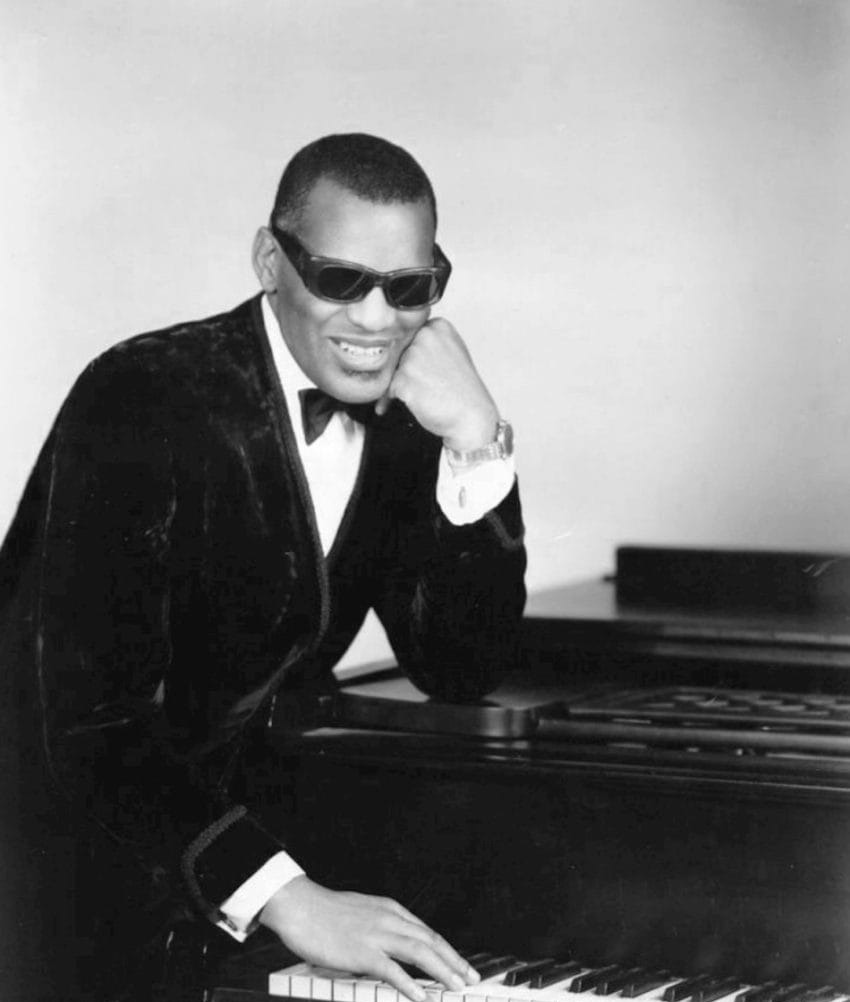Introduction
Ray Charles was an American R&B and soul singer-songwriter and pianist who became one of the pioneers and most important figures of soul during the 50s and 60s music era. He is called “The Genius” of soul music. He combined soul, R&B, gospel, pop and country to create enduring oldies classic songs such as “What’d I Say,” “Hit the Road Jack,” “Unchain My Heart” and “Georgia on My Mind.” More on Ray Charles here in this article.
Early life and career
The legendary soul singer Ray Charles was born Raymond Charles Robinson in Albany, Georgia on September 23, 1930. He was the son of a mechanic father and sharecropper mother. When he was three he got interested in music, when he and his family used to frequent at a local club where the owner played boogie woogie on an old piano. The club owner then taught Charles the rudiments of piano playing.
As he was growing up, the young Charles was also gradually losing his sight. Soon after the death of his brother, Charles, only aged 7, was by then completely blind as a result of glaucoma.
His mother sent him to a public school, the Florida School for the Deaf and Blind. This is where he learned to read and write in Braille, and in the process he began to write songs. Charles also learned many other instruments such as organ, trumpet and clarinet in addition to piano and organ.
Charles’ mother died when he was 15. A year earlier he became part of the growing “chitlin’ circuit” scene in the South and toured around the region. Then he moved to Seattle, Washington where he met a young Quincy Jones who would become his friend and collaborator for many years. Charles derived the style of his early influences such as Nat King Cole and Charles Brown, but soon he developed his own sound.
Charles released his first single in 1949 titled “Confession Blues” with the Maxin Trio. It peaked at #2 on the R&B singles chart. His following singles “Baby Let Me Hold Your Hand,” and “Kiss-A Me Baby” also went to Top 10 on the R&B chart. In 1953 Charles signed a recording deal with Atlantic, and had his first hit with the label with “It Should Have Been Me.”
Career peak and critical acclaim
Charles co-wrote, recorded and released the now-classic song “I Got a Woman” in 1955, which gave him his first #1 R&B hit. The song is a manifestation of his evolving musical style that finally set him apart from his idols like Nat King Cole. He never settled on one genre; instead, he effortlessly blended several musical genres from soul to pop to country to create his own unique style. By then, critics, fellow musicians and fans had begun to call him “The Genius.”
Charles eventually crossed over to pop music when his memorable tune “What’d I Say” which peaked at #6 on the Billboard Hot 100 and #1 on the R&B chart in 1959. It is one of Ray Charles’ defining songs.
Also in 1959 his contract with Atlantic expired. He moved to a new label, ABC-Paramount, in 1960, and things were looking up for this blind musical genius. The same year he yet again achieved another pop hit and now-classic ballad “Georgia on My Mind,” his cover of a Hoagy Carmichael song. It was his first #1 pop hit, and also peaked at #3 on the R&B chart. Over the years the song’s legend has grown even stronger; Rolling Stone included it on its “500 Greatest Songs” list and the song was also inducted into the Grammy Hall of Fame in 2014.
In 1961 Charles enjoyed his second #1 pop hit with the jaunty “Hit the Road Jack” in 1961. It also went to #1 on the R&B singles chart. The success and his stature in the music industry allowed him to exercise complete control over his material. In 1962 his new album Modern Sounds in Country and Western Music saw him breaking down the music barriers once again.
While his music career was flying high, Charles was fighting with his own personal demons. He had been addicted to heroin since he was a teenager, and his possession of heroin ultimately led him to his arrest in 1965.
Later life and career
Charles successfully avoided jail time by undergoing a rehab in Los Angeles. Although from the mid-60s and onwards saw him less chart action, his legendary status as one of the industry’s most respected musicians was already assured.
He also performed “We Are the World” alongside Michael Jackson, Lionel Richie, Billy Joel, Cyndi Lauper and many others in this all-star production, for the organization/supergroup USA for Africa.
Death and legacy
After 53 straight years spent touring, Charles cancelled his upcoming tour for the first time, in 2003. He underwent a hip injury which was a success and could have signaled his successful comeback. But his sufferings didn’t end there: Charles soon discovered that he had a liver disease.
On June 10, 2004, the world lost a music legend — Charles died at his Beverly Hills home, aged 73.
Charles released over 60 albums and played more than 10,000 concerts. He won 17 Grammy Awards, during his lifetime and after his death.
In 1986 Charles had the most prestigious honor of being one of the first musicians inducted into the Rock and Roll Hall of Fame, alongside Elvis Presley, The Everly Brothers, Chuck Berry and Jerry Lee Lewis.

